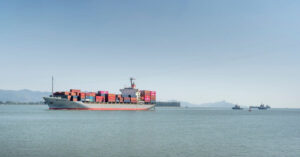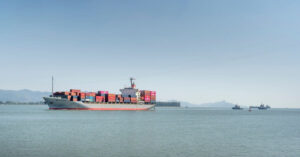U.S. Shipping Firm Matson Paid $6.4 Million Port Fees To China Before US-China Agree To Pause Levies

Norwegian Hydrogen AS Offered EUR 31.5 Million Grant For RjukanLH2 Project
November 4, 2025
Ro-Ro Passenger Ship Loses Control, Hits Moored Vessel At Port Of Jolo In The Philippines
November 5, 2025

U.S. shipping company Matson has paid $6.4 million in port fees to China since the charges were implemented on 14 October, the company’s Chief Executive Officer Matt Cox said on Tuesday.
The fees were part of reciprocal levies imposed by the United States and China amid escalating trade tensions between the two nations.
However, the pressure may soon ease after U.S. President Donald Trump and Chinese President Xi Jinping reached an agreement last week to suspend the levies for 12 months, starting 10 November.
Chinese media had previously reported that Hawaii-based Matson, one of the few global shipping lines operating U.S.-built and U.S.-flagged vessels, was among the first companies to pay the new Chinese port fees.
According to Cox, Matson expects the U.S. Trade Representative and China’s Ministry of Transport to release detailed instructions soon, which could include refund programmes related to the fees already paid.
The port levies were introduced after the Trump administration announced new charges on China-linked ships earlier this year. In response, China introduced similar port entry fees on vessels connected to the United States, enforcing them on the same day the U.S. tariffs came into effect.
Cox described the agreement between the two countries as a positive step, as it paused the levies, reduced U.S. tariffs on Chinese goods and temporarily lifted restrictions on China’s rare earth exports.
Without the suspension, Cox estimated that Matson could have faced annual port fees of around $80 million per year in 2026 and 2027.
Analysts said China’s state-owned COSCO Shipping Lines was the most affected by the U.S. port fees, which could have cost the company about $1.5 billion annually.
Matson reported consolidated revenue of $880.1 million for the third quarter of 2025, compared with $962.0 million during the same period in 2024. Cox said both the company’s Ocean Transportation and Logistics divisions had performed well despite the ongoing uncertainty.
He added that operating income fell compared with last year due to lower freight rates and reduced container volumes in Matson’s China service. Many businesses had shipped goods earlier in the year to avoid tariff deadlines, leading to weaker demand in the third quarter.
For the fourth quarter of 2025, Matson expects operating income to remain lower than last year because of weak freight rates and reduced shipping volumes.
However, the company expects a more stable trading environment as tariff and port fee uncertainties ease following the U.S.-China trade and economic deal announced on 30 October.
Reference: Reuters
Source: Maritime Shipping News


